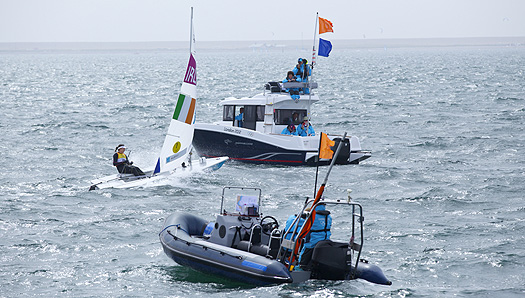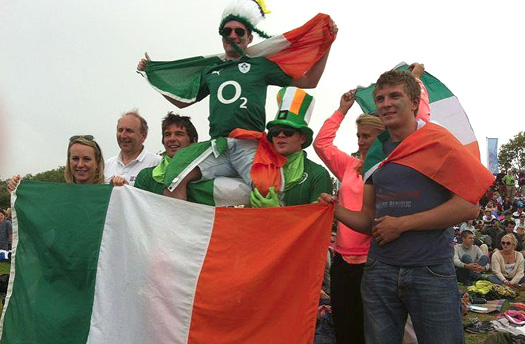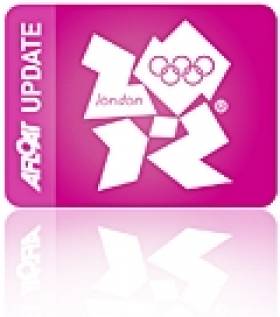Displaying items by tag: irish olympic sailing team 2012
Untouchable Annalise Makes it Four out of Four in Weymouth
#annalise – Four race wins for Annalise Murphy puts Ireland as the clear front runner for Olympic Gold next Monday in the Laser Radial. The strong Weymouth winds favoured by the untouchable Dun Laoghaire sailor are forecast to last for the remainder of the competition including the all important double points medal race.
Regardless of the Irish domination however the title is by no means a foregone conclusion at this early stage, Annalise is only a third of the way through the 11 race event.
Nevertheless in the modern era, winning four consecutive races at an Olympic regatta puts Annalise into a very special club. It's a point borne out by the media interest in the 22–year–old as she came ashore this afternoon.
"It can't get much better than winning the first four races but there's still six fleet races left so it's going to be really tough. All of the girls are really good and I think I've had a bit of luck and things have gone my way" Annalise told media.
Only a few sailors have ever won four olympic races in a row and they include multiple gold medallists Britain's Rodney Pattison in 1968 (scroll down for video below) and Denmark's Paul Elvstrom in Melbourne in 1956.
After 10 races, a sailor’s worst result is discounted and the 10 best sailors out of the 41 entrants have their points doubled in the medal race.
At this rate though the UCD science student — who has taken a break from her degree — could conceivably have a medal of some colour nicely in her sights in advance of then.

Annalise crosses the finish line of race four, 70 metres ahead
The National Yacht Club sailor reached every mark in first place today leading by as much as 70 metres at times. Her upwind and downwind boat speed totally dominated her 41-boat fleet, a feat never achieved in this fleet before. She has a best-possible scorecard of four points from four races sailed.
Belgian Evi Van Acker of Belgium, trails by some 12 points but remians a potent threat as does world champion Marit Bouwmeester of Holland in third.
Racing started in the Laser Radial class at 12 noon and Murphy again made a clean start carefully steering her way up the first leg grinding out a three boat length lead in less than a few minutes, going on to round all six marks of races three and four in the top position with a certain amount of inevitability.
Van Acker and Bouwmeester of the Netherlands are in the other medal positions, with Team GB's Alyson Young in fourth.
Murphy has two more races tomorrow and another couple on Friday and on Saturday.

The Murphy family take position on the hill at Weymouth. Come on Annalise!
In other Irish Olympic sailing team news Race 3 for the Irish 49er duo Ryan Seaton and Matt McGovern didn't get off to an ideal start this afternoon. The pair were 18th off the line and up until they rounded the second mark but they battled hard and moved up the fleet to finish in 15th.
They didn't dwell on the result though and came out guns blazing in Race 4. They were at the top of the fleet for the entire race, alternating between 2nd and 3rd position. Rounding the final mark and on the downwind run to the finish, Nathan Outteridge & Iain Jensenof (AUS) had a huge lead on Erik Storck & Trevor Moore (USA) and the Irish boys but the Aussies capsized at the very last minute. Seaton & McGovern capitalised on the error and moved up one place to finished 2nd. They maintain their position of 6th overall with a further 11 races to sail followed by the medal race.
Today was the third day of racing for the Irish Star sailors, Peter O'Leary and David Burrows. They began Race 5 toward the back of the fleet but moved up five places to 9th by the final mark. Unfortunately on the final run they lost two places to finish 11th.
There was an individual recall for some of the competitors who were over the start line in Race 6 and the Irish pair were among them. The penalty cost them and they finished the race in 11th. They finish the day in ninth overall with Iain Percy & Andrew Simpson (GBR) in 1st and Robert Scheidt & Bruno Prada (BRA) in 2nd. A further four races must still be sailed so it's still all to play for before the medal race on Sunday, 5th August.
James Espey also had his second day of racing today in the Laser class. He had a solid start in his first race but dropped eight places to finish 39th. He had his best start of the Games so far in Race 4 where he spent the first half of the race in 12th but slipped to finish 36th. Espey moves up two places to 40th overall with a further six races to sail before the top ten in the fleet sail the medal race.
Racing will continue tomorrow for the Laser Radial, 49er and Laser. The Star class are on a rest day. Sailing action starts at 12 noon in Weymouth.




























































